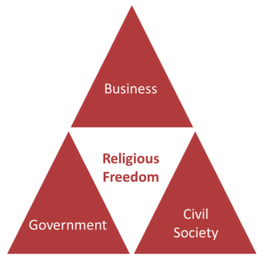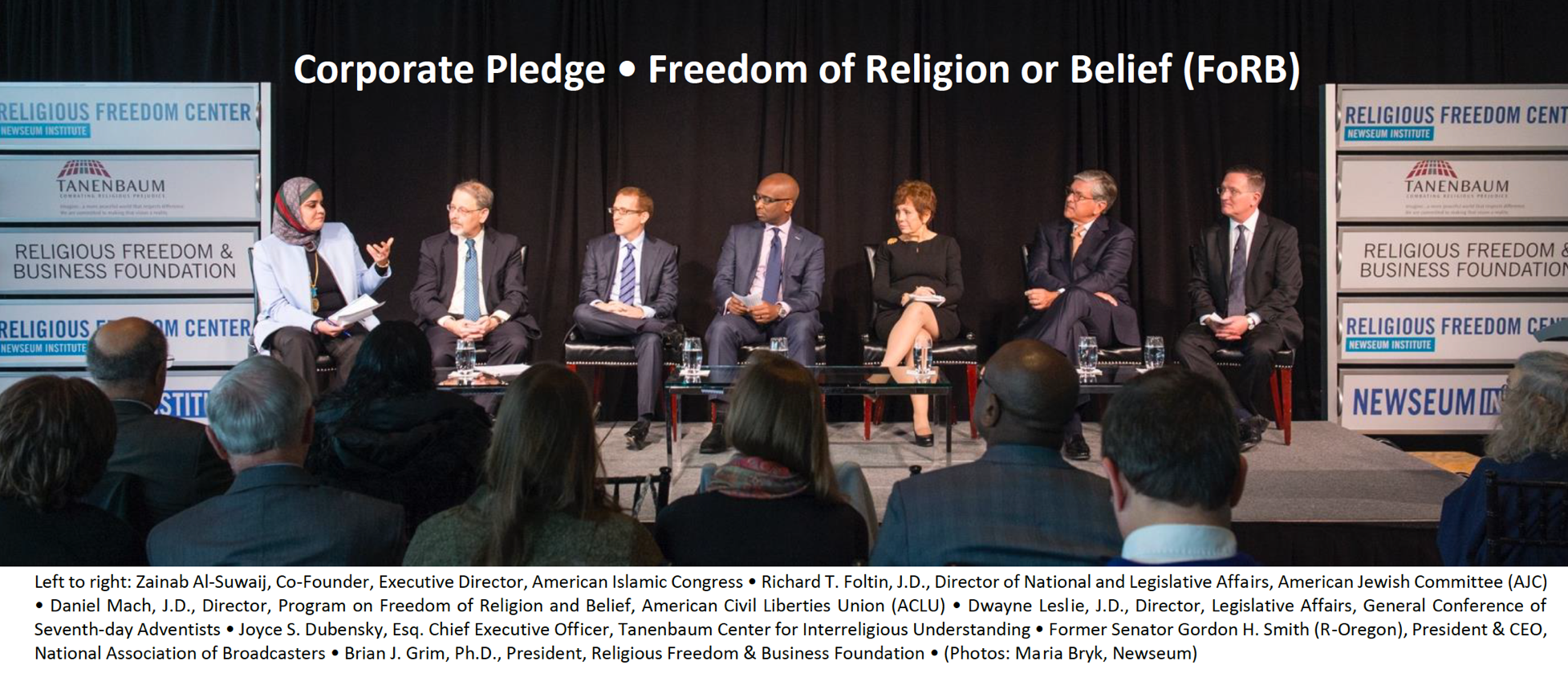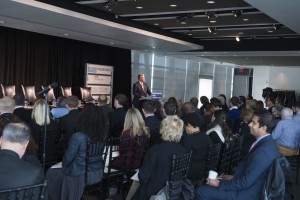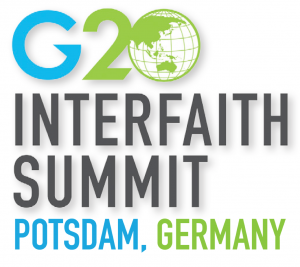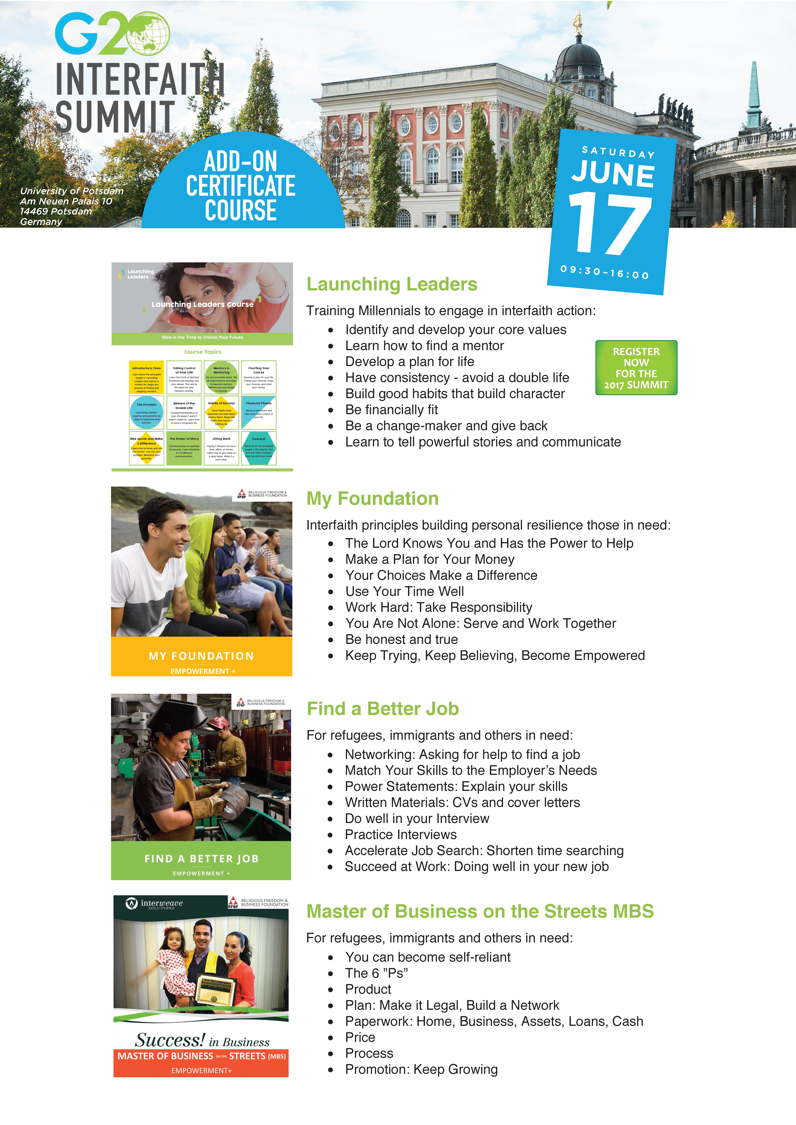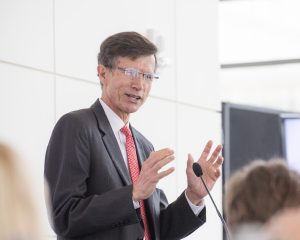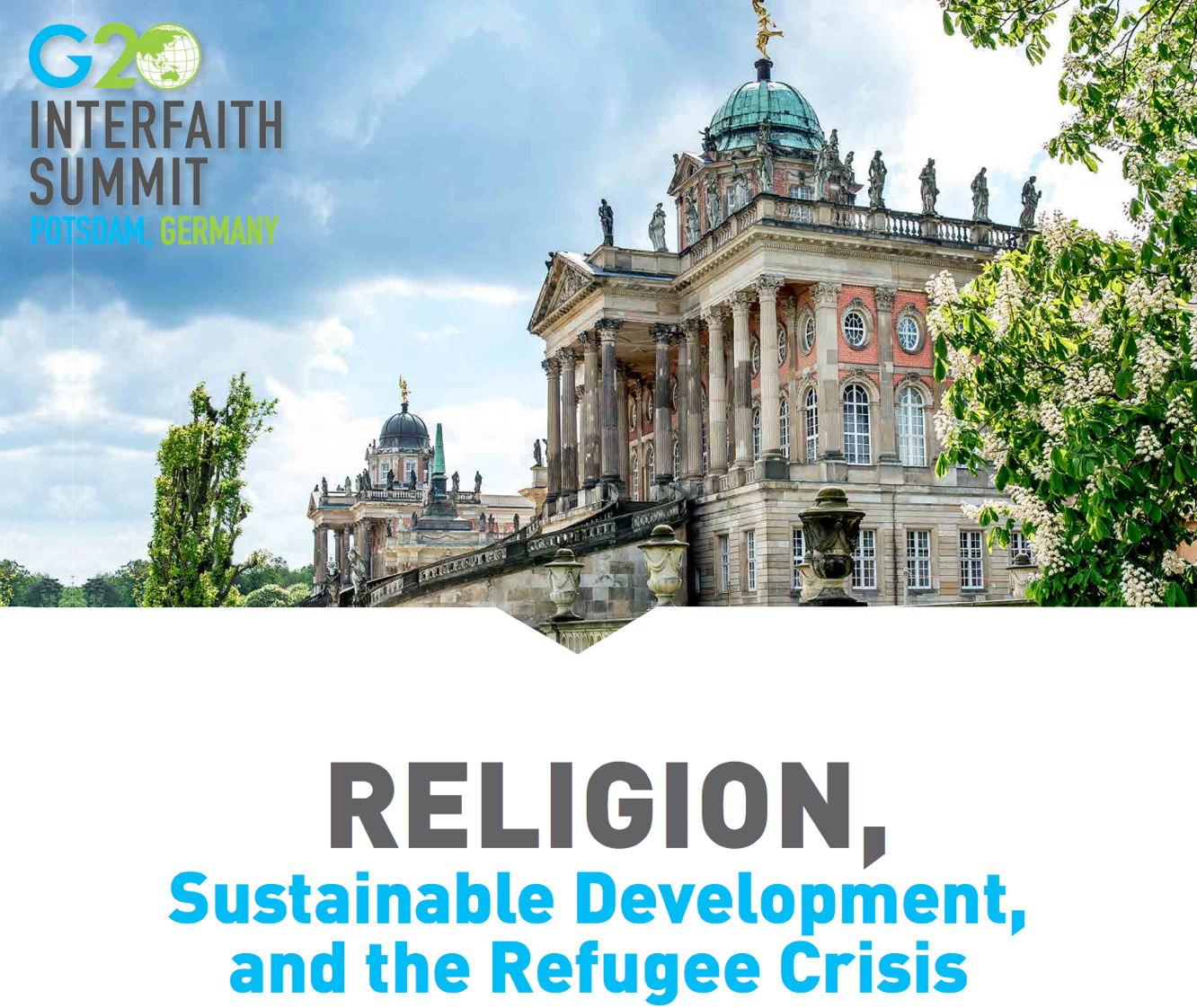Religious discrimination cases in the workplace have more than doubled over the past two decades. In 2016, there were 3,825 religion-based charges filed with the U.S. Equal Employment Opportunity Commission (EEOC) compared less than half that number (1,709 ) in 1997.
Ignoring religious discrimination can be costly for a company, as clothing retailer Abercrombie & Fitch found when the EEOC took a case against them to the U.S. Supreme Court. The justices decided 8-to-1 that the company violated civil rights law by failing to accommodate a job applicant who wore a hijab. The millions spent to fight the case by Abercrombie & Fitch, plus many more dollars in lost revenue due to bad publicity, are part of the story of a company whose stocks are today at a 17-year low. While the case may not have caused the company’s plummeting share prices, it certainly didn’t help.
 While not all cases taken to the EEOC were found to have merit, the steady increase of religion-based complaints shown in the chart is one sign among several that religion is the next big issue businesses must navigate.
While not all cases taken to the EEOC were found to have merit, the steady increase of religion-based complaints shown in the chart is one sign among several that religion is the next big issue businesses must navigate.
By way of comparison, charges of LGBT-based discrimination, which have also been on the rise, numbered 1,768 in 2016, fewer than half the number of religious discrimination complaints.
While the corporate world has paid significant attention to LGBT issues with most corporations rolling out major plans to address discrimination based on sexual orientation, there are very few corporations – if any – paying equal attention to discrimination based on employee’s religion or belief.
Prevalence of Religious Discrimination in the Workplace
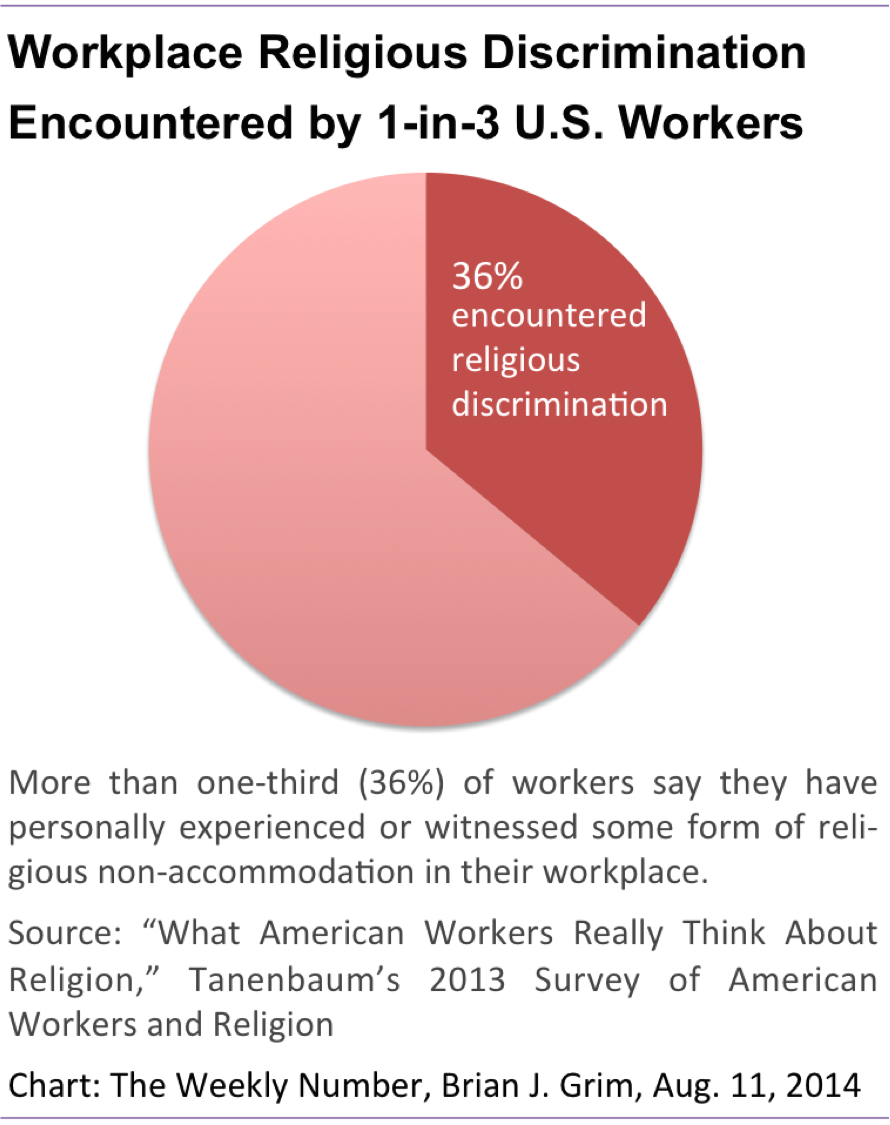 Indeed, the EEOC figures on religious discrimination in the workplace do not by themselves indicate the extent of the problem. More than one-in-three (36%) American workers report experiencing or witnessing workplace religious discrimination, according to a 2013 Tanenbaum survey, What American Workers Really Think about Religion.
Indeed, the EEOC figures on religious discrimination in the workplace do not by themselves indicate the extent of the problem. More than one-in-three (36%) American workers report experiencing or witnessing workplace religious discrimination, according to a 2013 Tanenbaum survey, What American Workers Really Think about Religion.
Nearly half of non-Christian workers (49%) report experiencing or witnessing religious non-accomodation at work. White evangelical workers (48%) are equally as likely to report experiencing or witnessing religious non-accommodation at work. And two-in-five (40%) atheists also report experiencing or witnessing religious non-accomodation.
Less than half of all workers surveyed report that their companies have the following key policies related to religious diversity: 1) flexible work hours to permit religious observance or prayer (44%); 2) materials explaining the company’s policy on religious discrimination (42%); 3) a policy to allow employees to “swap holidays” (21%); and 4) programs to teach employees about religious diversity (14%).
And all this is bad for business. The Tanenbaum survey found that 41% of workers at companies without clear processes for handling employee complaints – including religious discrimination complaints – say they are looking for a new job where they would be happier. This is nearly twice the rate as workers who say their companies do have clear processes (22%). Likewise, 32% of workers at companies without materials explaining the company’s policy on religious discrimination report that they are looking for a new job, significantly higher than workers at companies that offer these materials (25%).
Morale is higher in companies that provide flexible hours for religious observance. In such companies, 13% say that they do not look forward to coming to work, compared with 28% of workers at companies that do not provide this flexibility (13%) – more than a twofold difference.
Global Rise of Religion
 For those who are not personally active in religion, as are a growing number of people in some western societies, it may come as a surprise that the growth of religion is outpacing secular populations by a very wide margin. Between 2010 and 2050, the growth of religious populations worldwide is projected to be 23 times larger than the growth of religiously unaffiliated populations, as pointed out in a study done for the World Economic Forum’s Global Agenda Council on the Role of Faith.
For those who are not personally active in religion, as are a growing number of people in some western societies, it may come as a surprise that the growth of religion is outpacing secular populations by a very wide margin. Between 2010 and 2050, the growth of religious populations worldwide is projected to be 23 times larger than the growth of religiously unaffiliated populations, as pointed out in a study done for the World Economic Forum’s Global Agenda Council on the Role of Faith.
During this period, the number of people affiliated with a religion is expected to grow by 2.3 billion, from 5.8 billion in 2010 to 8.1 billion in 2050. By contrast, the number of people unaffiliated with any religion (including those who say their religion is “nothing in particular” as well as self-identifying agnostics and atheists) is projected to increase by only 0.1 billion, from 1.13 billion in 2010 to 1.23 billion in 2050. Also, in terms of population shares, this is significantly lower than the peak in the 1970s under communism when nearly one-in-five people worldwide were religiously unaffiliated, according to the World Religion Database (Brill).
What to Do?
The Religious Freedom & Business Foundation has compiled resources to help companies successfully navigate issues related to religion in the workplace and in society.
First and foremost, research shows that when freedom of religion and belief are respected in societies, they are more peaceful and prosperous.
The same principle works within companies. Accordingly, a company’s first step in successfully dealing with religious issues is to be in support of freedom of religion and belief in the workplace and in the societies where they operate.
The Pledge
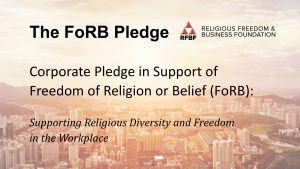 For instance, the Corporate Pledge in Support of Freedom of Religion or Belief (FoRB) — which supports religious diversity and freedom in the workplace — sends two clear messages to current and prospective employees: (1) You can work here without changing who you are; and (2) the company respects all employees and will not favor certain employees over others … and that’s good for the business of all.
For instance, the Corporate Pledge in Support of Freedom of Religion or Belief (FoRB) — which supports religious diversity and freedom in the workplace — sends two clear messages to current and prospective employees: (1) You can work here without changing who you are; and (2) the company respects all employees and will not favor certain employees over others … and that’s good for the business of all.
The FoRB Pledge is one component of a company’s overall strategy to value its employees and increase their loyalty for the benefit of customers and shareholders. The FoRB Pledge is a company’s public commitment to take reasonable steps to ensure that working at the company does not put employees at odds with their deeply held religious convictions.
The most successful businesses encourage an environment in which employees can bring their “full self” to work. Employees need to feel comfortable being who they are in the workplace, including being true to their core identity and beliefs. That includes recognizing and respecting an employee’s religion and its practice.
In today’s increasingly more competitive business environment, companies will need to draw upon the talent and experience of every employee. They can’t afford to leave anyone out. If they exclude or alienate someone for reasons having nothing to do with a person’s ability to do the job, they might also be excluding the next great business solution or the next great product idea. The very thing a company might need for its success. At the very least, they’ll be missing out on lots of really great talent.
And as companies become increasingly more global, they’ll need employees who reflect the increasing diversity of their customers. They’ll need employees who can relate to the daily experience of customers and who can see the customer point of view. For potentially billions of customers, religious belief and practice are a part of daily life. Having employees who understand that will not only help companies avoid costly missteps, it will also help companies develop products and services better tailed to customer needs. That’s an essential part of being competitive.
Download a 2-page flyer on the Pledge
And second, it is clear that nondiscrimination on the basis of religion or belief and religious accommodation are good for business. Businesses need to have clear policies on religious nondiscrimination and accommodation. Suggested policies are below.
Employee Policy
Recommended language for a Company’s HR policies:
Discrimination on the Basis of Religion or Belief. [Name of Company] is an equal opportunity employer, and prohibits discrimination on the basis of religion or belief. This prohibition on religious discrimination applies to all aspects of employment including, without limitation, recruitment, interviewing, hiring, training, job assignments, promotions, demotions, compensation, benefits, transfers, terminations, layoffs, firing, recalls, tuition assistance, and social and recreational programs.
It is the responsibility of every employee to strictly comply with this policy. This policy prohibits unlawful harassment of any kind, including jokes, slurs, offensive gestures, and bullying on the basis of religion or sincerely held beliefs. Furthermore, supervisors should allow religious expression among employees to the same extent that they allow other types of personal expression that are not harassing or disruptive.
Any employee who feels that he or she has been treated contrary to this policy, including any harassment by company personnel or work-related harassment by any other person, should contact his or her supervisor, any member of the Human Resources department or the Employee Relations office. Any employee who is found to have violated this policy shall be subject to disciplinary action up to and including termination of employment. [Name of Company] will not retaliate against any employee for filing a complaint and will not tolerate retaliation by management, employees, or co-workers.
Religious Accommodation. [Name of Company] respects the religious beliefs and practices of all employees and will provide, upon written request, a reasonable accommodation. A reasonable accommodation is one that does not create an undue hardship on the company’s business.
Requesting a Religious Accommodation. An employee whose religious beliefs or practices conflict with his or her job, work schedule, or with [Company Name]’s policy or practice on dress and appearance, or with other aspects of employment, and who seeks a religious accommodation must submit a written request for a reasonable accommodation to the company’s human resources department. The written request will identify the type of religious conflict that exists.
Providing Religious Accommodation. The human resources department will evaluate the request considering whether a work conflict exists and whether an accommodation is available that is reasonable and that would not create an undue hardship on [Company Name]’s business. Depending on the type of conflict and suggested accommodation, the human resources department may confer with the employee’s supervisor. The human resources department and employee will meet to discuss the request and decision on an accommodation within thirty (30) days of the employee’s request. If the employee accepts the proposed religious accommodation, the human resources department and/or the employee’s supervisor will implement the decision. If the employee rejects the proposed accommodation, he or she may appeal in accordance with the company’s general grievance policy and procedure.
External Policies
Possible language for a Company’s corporate social responsibility policies:
[Name of Company] is committed to treating every person with dignity and respect. No matter the religion or belief, the Company recognizes and promotes the economic value and social benefits of robust religious diversity and liberty.
In its interactions with suppliers and customers, including without limitation the decision to do business with such, [Name of Company] does not discriminate on the basis of religion or belief. The Company emphasizes the need for ethical working conditions for those within the Company’s supply chain. The Company encourages its suppliers to enact their own protections against religious discrimination and harassment.
In the larger community, [Name of Company] supports governments and organizations that protect religious liberty. Societies in which human rights are respected are more stable and provide a better environment for business. Businesses whether operating outside their country of origin or at home may have the opportunity to promote and help raise standards in countries where protection of human rights issues is insufficient, especially in ways that are strategically relevant to its core business.
Click here for all corporate documents on supporting freedom of religion or belief.





